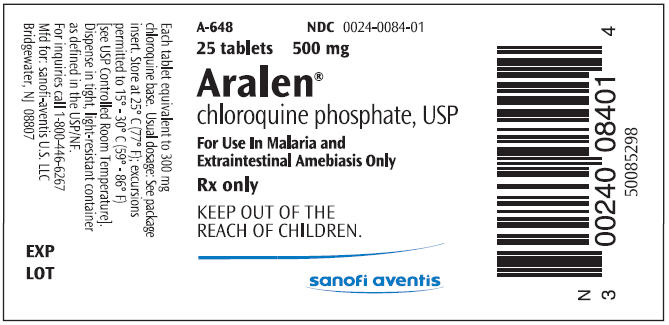
Aralen | Chloroquine Phosphate Tablet while Breastfeeding
What is Aralen | Chloroquine Phosphate Tablet used for?
What are the risk associated with Aralen | Chloroquine Phosphate Tablet usage while breastfeeding? What precautions shall I take while using it in breastfeeding?

Nursing Mothers Because of the potential for serious adverse reactions in nursing infants from chloroquine, a decision should be made whether to discontinue nursing or to discontinue the drug, taking into account the potential clinical benefit of the drug to the mother. The excretion of chloroquine and the major metabolite, desethylchloroquine, in breast milk was investigated in eleven lactating mothers following a single oral dose of chloroquine (600 mg base). The maximum daily dose of the drug that the infant can receive from breastfeeding was about 0.7% of the maternal start dose of the drug in malaria chemotherapy. Separate chemoprophylaxis for the infant is required. See DOSAGE AND ADMINISTRATION.
Aralen | Chloroquine Phosphate Tablet Breastfeeding Analsys
Chloroquine phosphate while Breastfeeding
SafeCAS Number: 54-05-7
No adverse effect has been described. Anti-malarial drug used for anti-inflammatory and immune suppressive medication on collagen diseases like idiopathic arthritis or lupus. After a dose of 5 mg per kilo taken by the mother only 0.2 mg is secreted into breast milk. This amount would not be harmful for the child since the dose to a child as chemo-prophylaxis for malaria is 8 mg per kilo each week. Avoid using it in patients suffering G-6-P-dehydrogenasa. American Academy of Pediatrics: Maternal Medication Usually Compatible With Breastfeeding.
Aralen | Chloroquine Phosphate Tablet Breastfeeding Analsys - 2
Chloroquine phosphate while Breastfeeding
CAS Number: 54-05-7
Very small amounts of chloroquine are excreted in breast milk; when given once weekly, the amount of drug is not sufficient to harm the infant nor is the quantity sufficient to protect the child from malaria. United Kingdom malaria treatment guidelines recommend that weekly chloroquine 500 mg be given until breastfeeding is completed and primaquine can be given.[1] Breastfeeding infants should receive the recommended dosages of chloroquine for malaria prophylaxis.[2] In HIV-infected women, elevated viral HIV loads in milk were decreased after treatment with chloroquine to a greater extent than other women who were treated with the combination of sulfadoxine and pyrimethamine.[3] Because no information is available on the daily use of chloroquine during breastfeeding, hydroxychloroquine or another agent may be preferred in this situation, especially while nursing a newborn or preterm infant.

I am nursing mother and I have already used Aralen | Chloroquine Phosphate Tablet, what should I do?
It is always a good idea to keep your healthcare provider or doctor informed about your drug usage during pregnancy and breastfeeding but if you have not informed your doctor about Aralen | Chloroquine Phosphate Tablet and have used it then do not panic as Aralen | Chloroquine Phosphate Tablet is mostly safe in breastfeeding and should not cause any harm to your baby.
I am nursing mother and my doctor has suggested me to use Aralen | Chloroquine Phosphate Tablet, is it safe?
Definitely, Aralen | Chloroquine Phosphate Tablet is safe in lactation for baby. No wonder your doctor has recommended it.
If I am using Aralen | Chloroquine Phosphate Tablet, will my baby need extra monitoring?
No extra baby monitoring required while mother is using Aralen | Chloroquine Phosphate Tablet
Who can I talk to if I have questions about usage of Aralen | Chloroquine Phosphate Tablet in breastfeeding?
US
National Womens Health and Breastfeeding Helpline: 800-994-9662 (TDD 888-220-5446) 9 a.m. and 6 p.m. ET, Monday through Friday
UK
National Breastfeeding Helpline: 0300-100-0212 9.30am to 9.30pm, daily
Association of Breastfeeding Mothers: 0300-330-5453
La Leche League: 0345-120-2918
The Breastfeeding Network supporter line in Bengali and Sylheti: 0300-456-2421
National Childbirth Trust (NCT): 0300-330-0700
Australia
National Breastfeeding Helpline: 1800-686-268 24 hours a day, 7 days a week
Canada
Telehealth Ontario for breastfeeding: 1-866-797-0000 24 hours a day, 7 days a week
